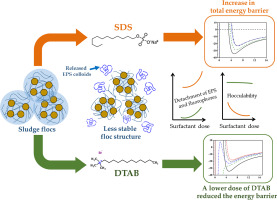Science of the Total Environment ( IF 8.2 ) Pub Date : 2018-03-21 , DOI: 10.1016/j.scitotenv.2018.03.187 Long-Fei Wang , Bao-Cheng Huang , Ling-Ling Wang , Yuan Min , Han-Qing Yu

|
A large amount of excess waste activated sludge is produced in municipal wastewater treatment plants and should be further disposed to avoid environmental pollution. Ionic surfactants are being widely used for sludge conditioning, but how and to what extent ionic surfactants change the sludge properties remain unclear. In this work, the impacts of two typical ionic surfactants on the flocculability and stability of sludge were investigated by using experimental and theoretical analyses. The treatment of anionic sodium dodecyl sulfate (SDS) resulted in more detachment of extracellular materials and fluorophores from sludge compared to the treatment of cationic trimethyl ammonium bromide (DTAB). Fourier transform infrared spectra analysis indicates the promoted release of proteins and polysaccharides induced by the surfactants. Deteriorated flocculability of sludge was observed for the SDS-treated sludge, while treatment of DTAB slightly affected the overall sludge flocculability. The sludge floc structure became less stable after treatments of both surfactants, as confirmed by the elevated dispersed mass concentration of small particles in shearing tests. The relationship between the content of extracellular polymeric substances, surfactant dose and sludge properties were evaluated and the roles of released extracellular polymeric substances and surfactant dose in affecting sludge flocculability were examined. Extended DLVO approach was adopted to explore the stability of sludge. By using such an integrated approach, the impacts of ionic surfactants on sludge flocculability and stability were revealed, which is useful in understanding the mechanisms of sludge conditioning by surfactant treatment.
中文翻译:

离子型表面活性剂对污泥特性影响的实验和理论分析
在市政废水处理厂中会产生大量过量的废活性污泥,应进一步处理以避免对环境的污染。离子表面活性剂已被广泛用于污泥处理,但是离子表面活性剂如何以及在多大程度上改变污泥性质仍不清楚。在这项工作中,通过实验和理论分析研究了两种典型的离子型表面活性剂对污泥的絮凝性和稳定性的影响。与阳离子三甲基溴化铵(DTAB)的处理相比,阴离子十二烷基硫酸钠(SDS)的处理导致污泥中更多的细胞外物质和荧光团脱离。傅里叶变换红外光谱分析表明,表面活性剂可促进蛋白质和多糖的释放。经SDS处理的污泥观察到污泥的絮凝性恶化,而DTAB的处理对污泥的总体絮凝性产生了轻微影响。两种表面活性剂处理后,污泥絮凝物的结构变得不太稳定,这在剪切试验中已证实小颗粒的分散质量浓度升高。评价了细胞外聚合物含量,表面活性剂剂量与污泥性质之间的关系,并考察了释放的细胞外聚合物含量和表面活性剂剂量对污泥絮凝性的影响。采用扩展的DLVO方法来研究污泥的稳定性。通过使用这种集成方法,揭示了离子型表面活性剂对污泥絮凝性和稳定性的影响,











































 京公网安备 11010802027423号
京公网安备 11010802027423号